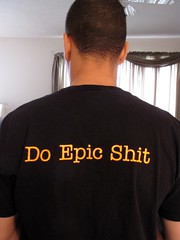 I used to be a huge fan of working remotely. I still am, but I used to be, too. My view on working has changed drastically in the past 3-4 years, when I’ve had to come up with ingenious ways to work while not being at home, or at my own office. In fact, I spend around 4 hours a week at my own office, and the remaining ~45 hours per week that I put in I work elsewhere.
I used to be a huge fan of working remotely. I still am, but I used to be, too. My view on working has changed drastically in the past 3-4 years, when I’ve had to come up with ingenious ways to work while not being at home, or at my own office. In fact, I spend around 4 hours a week at my own office, and the remaining ~45 hours per week that I put in I work elsewhere.
I’ve listed a few quick productivity tips that I find invaluable and keep using on a daily basis:
Instead of meetings, arrange voice conferences. Whenever I get an invitation to attend a meeting, the smallest unit of time is typically 60 minutes. It’s never 15 minutes. I simply feel that most work should be done before the meetings, and meetings should be quick status checks.
I’m happy to see so many companies embrace online video conferencing – it’s usually Lync, Skype or WebEx and they all work wonderfully. The downside is that it might be challenging to find a private space to attend a voice-based meeting.
 Arrange to have breakfast and lunch meetings on the same day. For me it’s Friday. I have all my breakfast meetings, lunch meetings and similar arranged for one specific day of the week. This helps me to avoid breaking my week into multiple shorter periods of work divided by random meetings around the city. Friday is considered “do stuff that needs to be done but doesn’t necessarily yield direct revenue”. It took me a few years to embrace this ideology, and now I’m more effective because of this.
Arrange to have breakfast and lunch meetings on the same day. For me it’s Friday. I have all my breakfast meetings, lunch meetings and similar arranged for one specific day of the week. This helps me to avoid breaking my week into multiple shorter periods of work divided by random meetings around the city. Friday is considered “do stuff that needs to be done but doesn’t necessarily yield direct revenue”. It took me a few years to embrace this ideology, and now I’m more effective because of this.
The obvious downside is that on certain Friday’s I do 4 lunch meetings in a row, so I aim to eat lightly.
![]() Find ways to convert downtime to uptime. We all have downtime. For me, it’s travel time, and random timeslots here and there when I’m moving from one client site to another, or when a workshop ends 2 hours earlier than I’ve anticipated. The number one productivity tool for me to catch up on things, check emails, Twitter, LinkedIn, Facebook and RSS is iPad. I use it constantly, if just for checking something trivial for 30 seconds. If I have more than 30 minutes I head to the nearest café to work with my laptop. If I have more than an hour, I either head home or one of our offices, whichever is nearest.
Find ways to convert downtime to uptime. We all have downtime. For me, it’s travel time, and random timeslots here and there when I’m moving from one client site to another, or when a workshop ends 2 hours earlier than I’ve anticipated. The number one productivity tool for me to catch up on things, check emails, Twitter, LinkedIn, Facebook and RSS is iPad. I use it constantly, if just for checking something trivial for 30 seconds. If I have more than 30 minutes I head to the nearest café to work with my laptop. If I have more than an hour, I either head home or one of our offices, whichever is nearest.

Avoid doing useless stuff that is interesting. There’s so much interesting stuff to do. Too bad most of the interesting stuff is pretty useless. It doesn’t grow my business and it doesn’t provide me with anything else than satisfy my curiosity or force me to act based on external stimulus.
A great example comes to mind, that I just recently encountered: My mobile phone informs me that there’s an update available. Having just reinstalled my laptop I don’t have Zune installed, or a micro usb-cable available. I could spend the next 15 minutes setting those up and patching the phone – or do something more worthwhile, and just leave the phone without the update. I’ll probably perform the update on a slow Saturday evening anyway.
Some vaguely familiar software vendor sent me an email asking to fill out their customer satisfaction survey. It will only take 25 minutes, they promised. Or, I could spend 25 minutes doing something productive and simply not answer the survey. It’s amazing how much time emails can command by simply asking you to do something.
You don’t have to do everything people ask you to do – you just have to do what’s essential.
Multitasking – yes, I prefer it to single tasking. I’m writing this article while conducting 2 instant messaging conversations, and listening to a webcast. I’ve tried moving back to single tasking and feel that my productivity drops by at least 50%, and so much is left undone. The challenge with multitasking is the fact that you need to be aware of what is important, so that you can quickly and effectively drop whatever you are doing when something more important arises. And have time at the end of the day to clean up the tasks that are not done.
 Make a list. Make it short. I start each morning with a simple list. It’s a list of 3-5 most important things I have to get done before I head home. When I’m done with those 3-5 items, I stop working. If the list grows too long I know I’m not concentrating on proper things, but just cherry-picking what I feel like is nice to do. It’s a gruesome exercise to leave out something you so badly want to do in favor of something mundane that has to be done.
Make a list. Make it short. I start each morning with a simple list. It’s a list of 3-5 most important things I have to get done before I head home. When I’m done with those 3-5 items, I stop working. If the list grows too long I know I’m not concentrating on proper things, but just cherry-picking what I feel like is nice to do. It’s a gruesome exercise to leave out something you so badly want to do in favor of something mundane that has to be done.
And I write the list by hand on real paper. OneNote just doesn’t give me the sense of urgency.
 Cut it and stack it. In Finnish we have a saying, “Poikki ja pinoon”, which roughly translates to cut it, stack it and forget about it. I’m a huge advocate of doing things fast, being efficient and shipping when it’s “good enough”, rather than polishing it indefinitely. The key here is to have the mind’s eye to understand when something is good enough, and when something is still crappy.
Cut it and stack it. In Finnish we have a saying, “Poikki ja pinoon”, which roughly translates to cut it, stack it and forget about it. I’m a huge advocate of doing things fast, being efficient and shipping when it’s “good enough”, rather than polishing it indefinitely. The key here is to have the mind’s eye to understand when something is good enough, and when something is still crappy.
Be productive & be happy!
One thought on “A few productivity tips for working remotely”